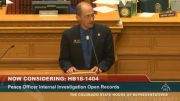The Senate Local Government Committee on Tuesday unanimously endorsed a bill intended to shield state agency whistleblowers, despite fears from officials of several state government departments that it would make confidential information more vulnerable to security breaches.
SB 15-275, which is sponsored by both Democrat and Republican leaders of the General Assembly, would protect state employees from being disciplined in retaliation for providing information to state lawmakers about possible government waste, fraud or other problems, even if the information proves to be false.
As amended, it also would declare the legislature to be a health oversight agency so that it can receive redacted health information that is protected from disclosure by the federal Health Insurance Portability and Accountability Act (HIPAA).
Senate Minority Leader Morgan Carroll, D-Aurora, said she’s seen several instances over the years in which employees have been fired or otherwise retaliated against for coming forward with information. That has created “a very serious chilling effect,” she said, making it more difficult for lawmakers to oversee functions of the executive branch.
“If you can’t get factual information with which to do your oversight, we don’t do oversight and it becomes (oversight) in name only,” Carroll said.
Officials of several state agencies testified against the bill as did others responsible for keeping private and proprietary information confidential.
SB 15-175 makes clear that information already confidential under the Colorado Open Records Act (CORA) is supposed remain confidential. However, opponents expressed concerns that peoples’ privacy may not remain intact if legislators are given access to confidential information from state government employees.
“If this language is passed, it may set up a conflict between what CORA holds as exempt and what legislators are allowed to access,” said Ann Hause, director of legal and regulatory affairs at the Colorado Department of Public Health and Environment.
The Colorado Press Association and Colorado Broadcasters Association have not voiced any concerns about the bill’s effect on the availability of information that currently is public.
CORA already exempts as “work product” any correspondence from a constituent to an elected official that “clearly implies by its nature or content” that the constituent expects the email or letter to be confidential. The same exemption applies to the elected official’s response to the constituent.
Follow the Colorado Freedom of Information Coalition on Twitter @CoFOIC. Like CFOIC’s Facebook page. Do you appreciate the information and resources provided by CFOIC? Please consider making a tax-deductible donation.




